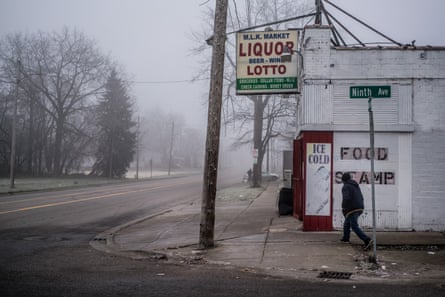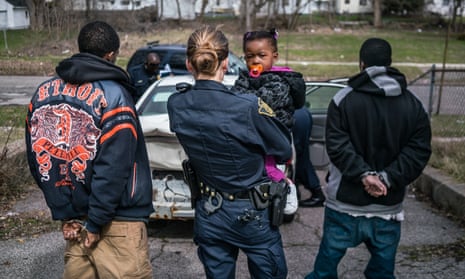In the new Netflix documentary series Flint Town, city police officers are called to respond to a drug incident: patrol lights flash, the camera convulses and police are shouting and drawing their weapons. A split second later, the chaos stops and an officer is telling the suspect he’s cuffing: “Boy, you look just like your daddy.”
The officer, Scotty Watson, checks the suspect for drugs and weapons while telling him how long he’s known his father. When Watson needs to inspect the boots of his friend’s son, the suspect, he offers him a seat in the police car so his socks don’t get wet on the damp ground.
“It’s probably not unfair to say that these are some of the things that are happening in other departments, we just don’t really see these stories or hear these stories, there’s never been access in this way,” said the series co-director Drea Cooper.
While the world might know Flint best as the city where the water crisis happened, the eight-part series unravels that snapshot description to show what happens when corruption, violence and poverty gnaw a city to its bone.
Episodes are stacked with local and personal dramas tied to the series’ main characters – about a dozen police officers in Flint’s understaffed and underfunded force. Given the renewed scrutiny placed on police since demonstrators in Ferguson took to the streets to protest against police violence in August 2014, these armed officers are an unlikely vehicle for showcasing systemic issues.
“It was our intention to do something that added additional layers to that,” said series co-director Jessica Dimmock. “It felt important to us that we go home with officers, we learn about their personal lives or personal struggles, we understand the emotional toll when someone’s mother dies or they are having relationship troubles. But also show that policing doesn’t exist in a bubble in this city.”
The episode where Watson arrests his longtime pal’s son is loosely focused on the uptick in crime at Halloween, but also features Donald Trump’s visit to Flint while running for president.
Lazier documentarians could have stuffed the episode with Trump’s quotes, but this trio, which is rounded out by co-director Zackary Canepari, instead train the camera on the people that surround Trump: the police officers nestled between Secret Service agents; the reverend who interrupts Trump mid-speech to explain they invited him to the city to thank him for his water donation, not to campaign; and the packed crowds of cameramen and community members.
As the now-president smiles and waves, a black woman asks: “What did you mean by African Americans have nothing to lose if they vote for you?” (Trump’s full quote, from a 2016 campaign rally, was: “What do you have to lose by trying something new, like Trump? You’re living in your poverty, your schools are no good, you have no jobs, 58% of your youth is unemployed, what the hell do you have to lose?”)
Trump tells the woman: “They have nothing to lose, believe me.”
As Trump exits the room, a man shouts: “So will you admit President Obama is an American?”
Then, the episode moves on. On to police officers canvassing neighborhoods ahead of a local vote that could lead to job cuts; to the arsons that plague the city every Halloween holiday and to officer Keith Urquhart’s response to a woman who says her children can’t walk down their own street because it’s infested by drug dealers.
Urquhart heads to the neighborhood and takes apart a shoddy bench the woman said had been the site of drug deals. “The little bit we’re doing, maybe her son can walk down the street, clean, for two weeks,” Urquhart says.

These glimmers of hope appear throughout the eight episodes, a punchy reminder of Flint’s resilience.
“The show is about the people in this community that are fighting for it,” Canepari said. “These people are still there and they are still trying to make it work. They continue to try and make it work with nothing. And that’s an impossible situation.”
Canepari and Cooper wanted to explore Flint more after spending time in the city to film a documentary, T-Rex, about the Olympic gold-medal winning boxer Claressa Shields. After completing the film, they continued to work in Flint and eventually convinced the police department to let the documentarians into their work and home lives.
This includes police roll call the day after the Dallas police shooting in July 2016, when a black army veteran killed five police officers during an anti-violence demonstration.
Officers take their turns explaining how this affects them before the lens focuses on their wives, fiancees and girlfriends, including a fellow officer.
These women speak directly to the camera about what it means to be with a police officer: how they all have a plan for the worst, how they worry about being out with their partners off-duty, because someone they arrested might recognize them and how they are constantly on alert.
“Whether it’s morning, night, while you’re sleeping, while you get your coffee, it never stops,” says Latoya Urquhart.
In a news cycle dominated by outrage, the documentary’s unprecedented access to a police department pierces through snarky tweets and 24-hour news network arguments to present the complicated web that has left Flint one of the poorest cities of its size in the country.
- Flint Town is now streaming on Netflix
